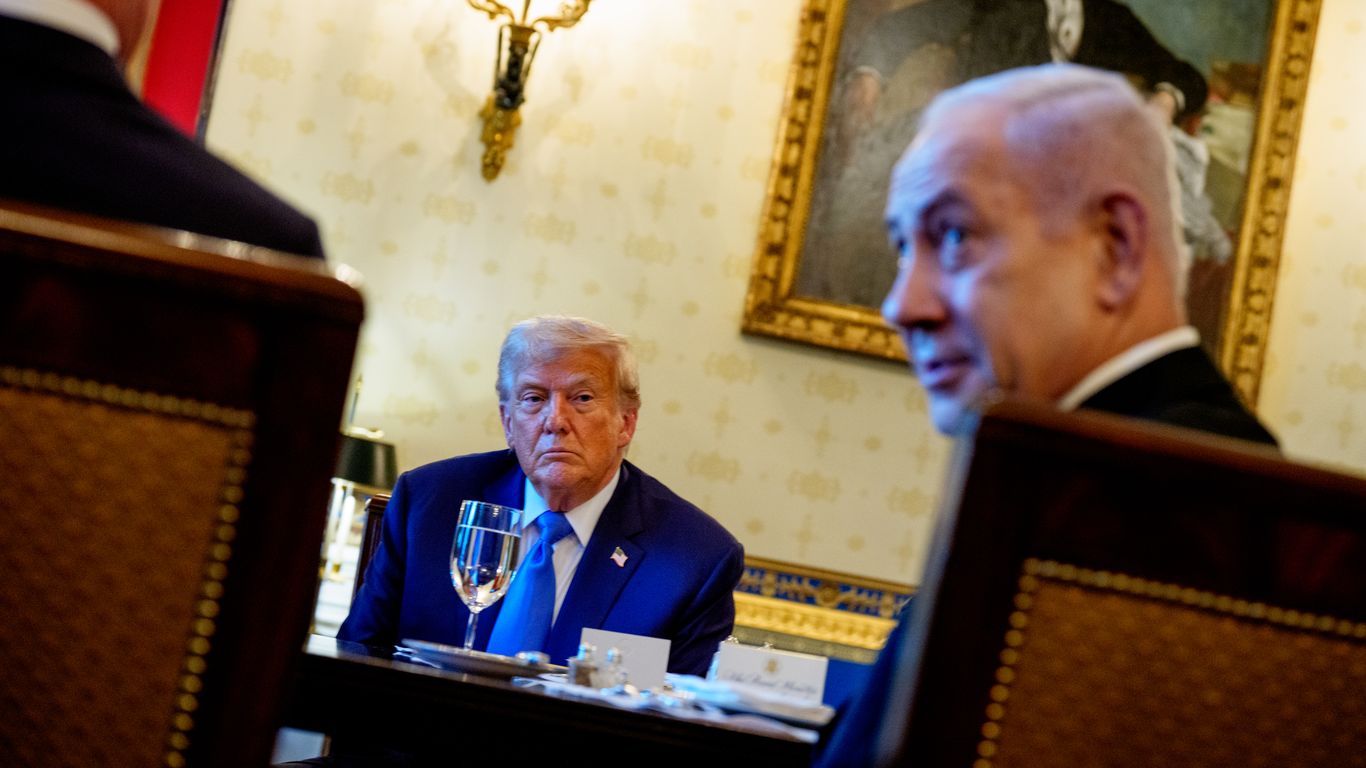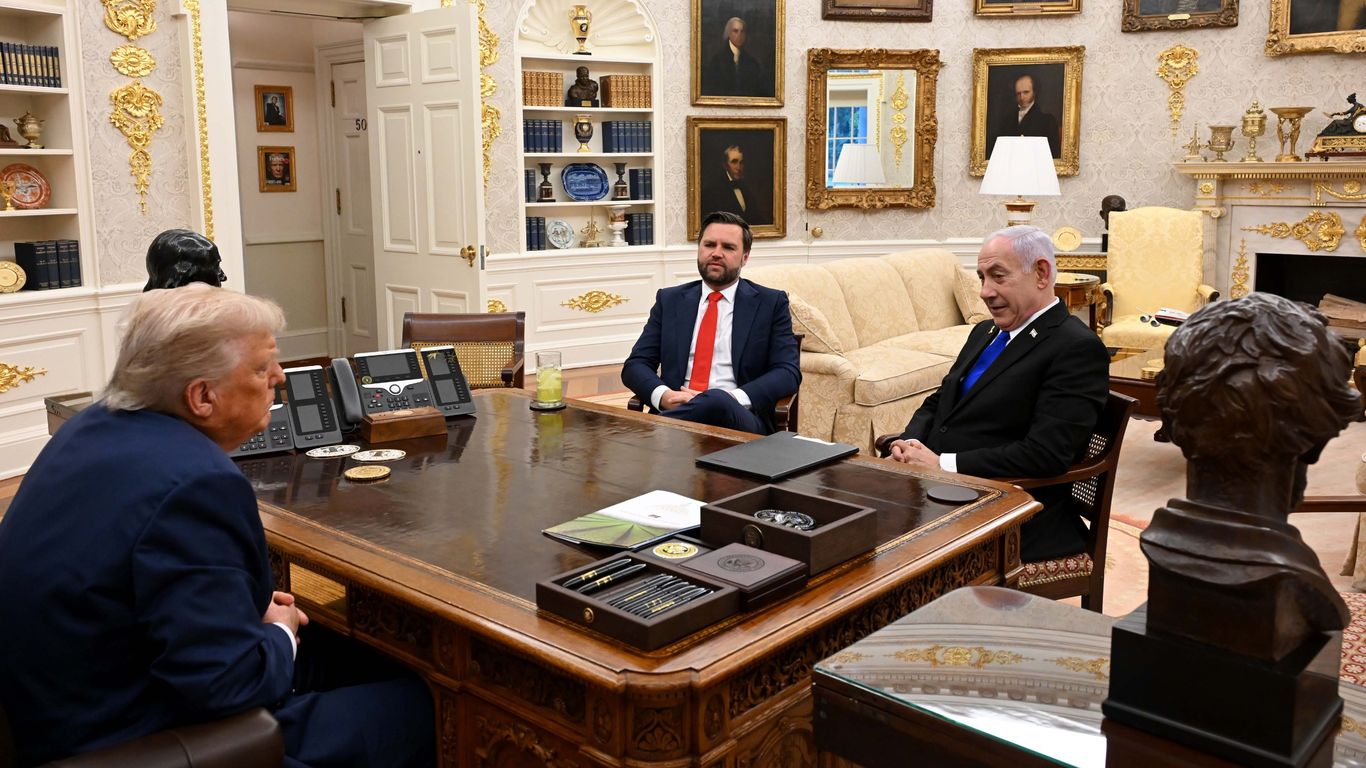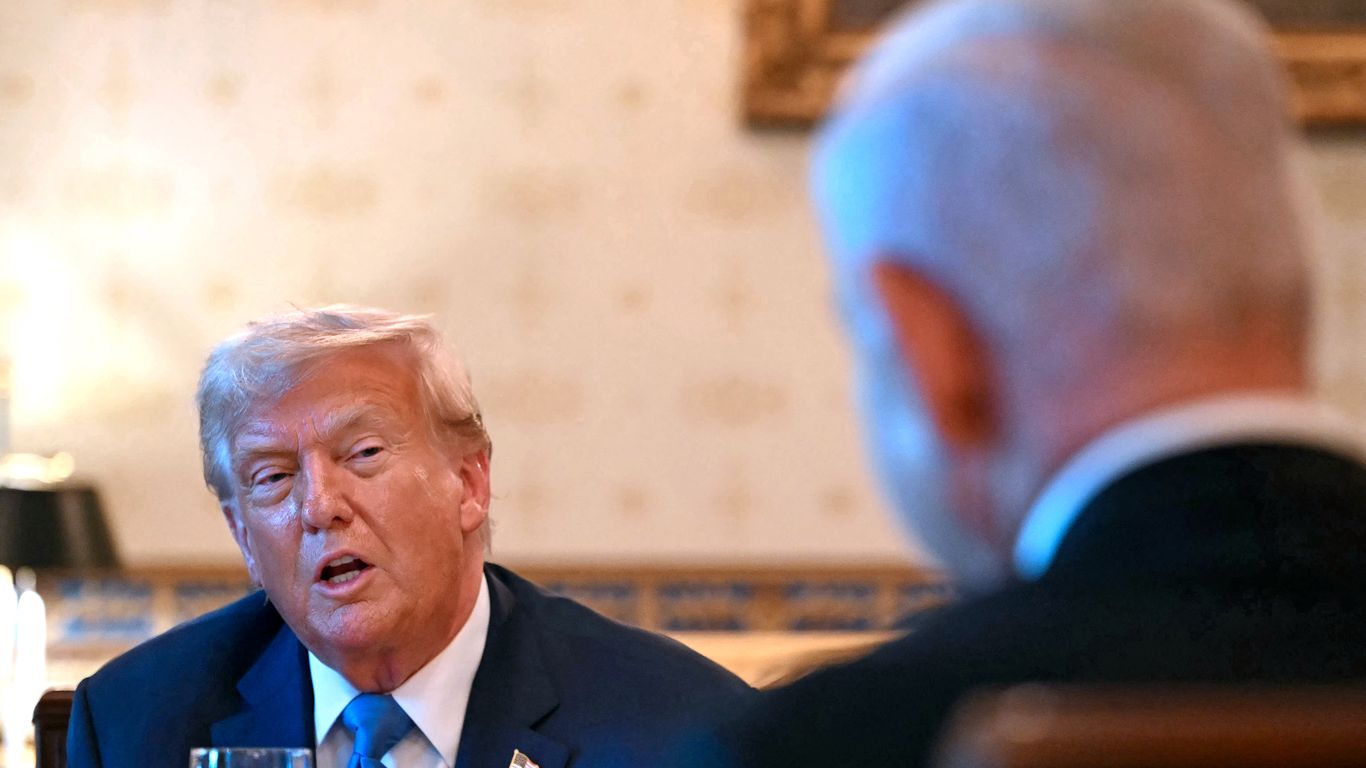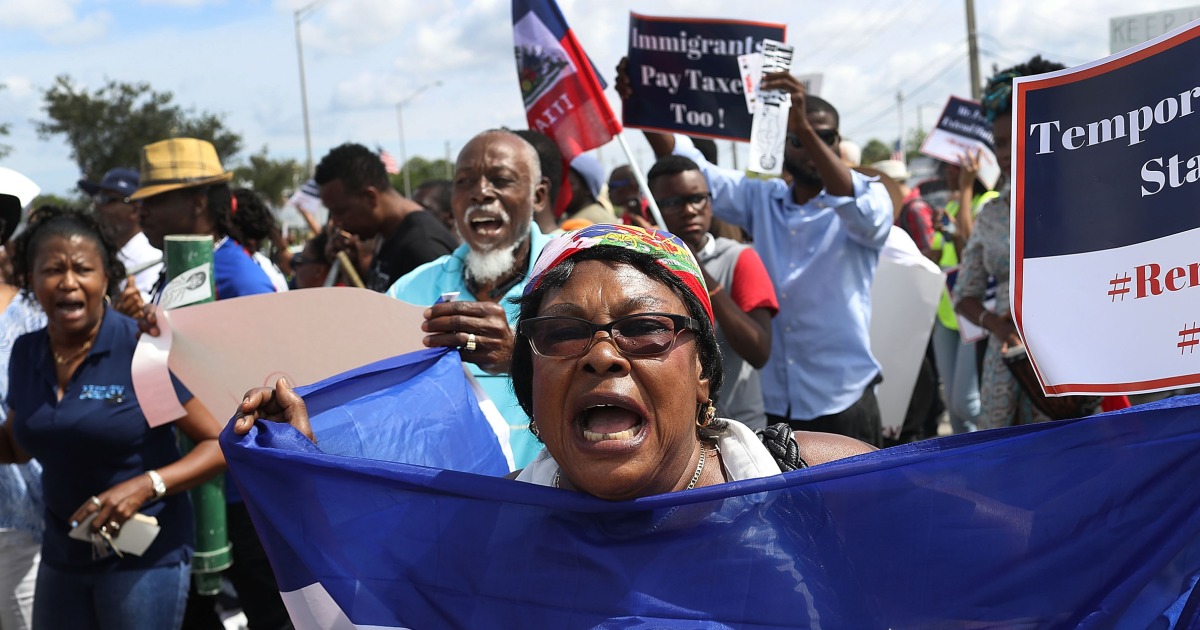Trump Demands Israel Commit to Never Striking Qatar Again

Introduction
In a shocking move, President Trump has demanded that Israeli Prime Minister Netanyahu commit to never striking Qatar again. This comes after a recent attack by Israel on the Gulf nation, which not only damaged Israel's reputation on the global stage, but also potentially jeopardized America's standing in the region.
Key Details
The attack on Qatar has caused tension between Israel and the Middle East, especially with other Arab nations such as Saudi Arabia and the UAE. The incident has also strained the relationship between the US and Israel, as the US has close ties with Qatar and sees the attack as a threat to regional stability. This demand from Trump has further complicated the situation and raised concerns about the US' involvement in the region.
Impact
The demand for a commitment to not strike Qatar again has sparked debate on the extent of US influence on Israeli actions. It also raises questions about the stability of the region and the impact on international relations. The demand could potentially damage the US' role as a mediator in the Israeli-Palestinian conflict and create further divisions in the Middle East. This move by Trump could have long-term implications on the region and the US' foreign policy in the Middle East.
About the People Mentioned
Donald Trump
Donald John Trump, born June 14, 1946, in Queens, New York, is an American businessman, media personality, and politician. He graduated from the University of Pennsylvania’s Wharton School in 1968 with a degree in economics. In 1971, he took over his family’s real estate business, renaming it the Trump Organization, through which he expanded into building and managing skyscrapers, hotels, casinos, and golf courses. Trump gained widespread fame as the host of the reality TV show *The Apprentice* from 2004 to 2015, which helped establish his public persona as a successful entrepreneur. Trump entered politics as a Republican and was elected the 45th president of the United States, serving from 2017 to 2021. His presidency was marked by significant policy actions including tax cuts, deregulation, the appointment of three Supreme Court justices, renegotiation of trade agreements (notably replacing NAFTA with the USMCA), and a focus on immigration control including border wall expansion. He withdrew the U.S. from international agreements such as the Paris Climate Accord and the Iran nuclear deal, and engaged in a trade war with China. His administration’s response to the COVID-19 pandemic was criticized for downplaying the virus’s severity. Trump was impeached twice by the House of Representatives—first in 2019 for abuse of power and obstruction, and again in 2021 for incitement of insurrection—but was acquitted by the Senate both times. After losing the 2020 election to Joe Biden, Trump challenged the results, culminating in the January 6, 2021, Capitol riot. He remains a central figure in American politics, having won the 2024 presidential election and returned as the 47th president in 2025, continuing to promote policies aimed at economic growth, border security, and military strength[1][2][3][4].
Benjamin Netanyahu
Benjamin Netanyahu, born on October 21, 1949, in Tel Aviv, Israel, is a prominent Israeli politician and diplomat who has served as Prime Minister of Israel three times (1996–1999, 2009–2021, and from 2022 onwards). He began his career in the Israeli military's special operations and later transitioned into politics in the late 1980s, joining the Likud party[1][2]. Netanyahu first became prime minister in 1996, during which time he signed the Hebron and Wye Accords, advancing peace efforts with the Palestinians. His administration focused on economic reforms such as government privatization, liberalizing currency regulations, and reducing deficits. After losing the 1999 election, he served as foreign minister and finance minister before reclaiming the Likud leadership in 2005[1][3][4]. Returning as prime minister in 2009, Netanyahu formed a national unity government and proposed a demilitarized Palestinian state recognizing Israel as the Jewish state, emphasizing security concerns. His tenure was marked by fluctuating peace negotiations with the Palestinians and contentious policies including settlement expansions. He also maintained a hawkish stance on Iran and supported the Iraq war[1][3][5]. In 2022, Netanyahu made a political comeback as prime minister, leading a coalition that included far-right parties. His leadership during this period has been pivotal amid the 2023–2024 Israel-Hamas conflict, with significant domestic and international implications[2]. Netanyahu is Israel’s longest-serving prime minister and remains a central figure in Israeli politics, known for his strong security policies, economic reforms, and complex role in the Israeli-Palestinian conflict. His career has been marked by both political resilience and controversy, reflecting his enduring influence on Israel’s domestic and foreign affairs[2][3][5].
About the Organizations Mentioned
US
The query seems to be about providing a summary of the organization "US," which could be interpreted as the United States government or a specific entity within it. However, without a clear reference to an "organization" named "US," I will provide a comprehensive overview of the United States government, focusing on its structure, history, achievements, current status, and notable aspects relevant to business and technology. ## Overview of the United States Government The United States government is a federal republic with a system divided into three branches: the legislative, executive, and judicial. This structure is designed to provide checks and balances on each branch. ## History The U.S. government was established in 1789 under the Constitution, which outlines the framework of the federal system. Over time, the government has evolved through numerous amendments and reforms, shaping policies and laws that impact various sectors, including business and technology. ## Key Achievements - **Economic Growth**: The U.S. has been a global leader in economic growth, innovation, and technological advancements, fostering a strong business environment. - **Technological Advancements**: The government has supported significant technological developments, such as the internet and space exploration, through funding and regulatory frameworks. - **Regulatory Frameworks**: Agencies like the Federal Trade Commission (FTC) and the Federal Communications Commission (FCC) play crucial roles in regulating industries and ensuring consumer protection. ## Current Status Currently, the U.S. government is engaged in various initiatives to address contemporary challenges such as climate change, cybersecurity, and healthcare reform. The government also continues to evolve its organizational structure, with ongoing discussions about the role of the executive branch, as seen in initiatives like Project 2025. ## Notable Aspects - **Project 2025**: This initiative, backed by the Heritage Foundation, aims to restructure the federal government to align with conservative ideals, potentially impacting civil rights and executive branch powers. - **Standards and Regulations**: The U.S. Standards Strategy,
Israel
Israel is a highly developed democratic country in West Asia, known for its advanced free-market economy and significant contributions to global business and technology sectors. Established in 1948, Israel has grown into a regional powerhouse with a population of approximately 9.5 million as of 2025. It is the only country with a Jewish majority population and operates under a parliamentary democracy with strong political rights and civil liberties[2][5]. Israel's economy is among the most sophisticated in the Middle East, ranked 25th globally by nominal GDP according to the IMF in 2025. It boasts the second-largest number of startups worldwide, only behind the United States, and the third-largest number of companies listed on NASDAQ after the U.S. and China. This vibrant tech ecosystem attracts major multinational corporations such as Intel, Microsoft, Apple, IBM, Google, and Facebook, all of which have established research and development centers in Israel, often marking their first overseas R&D presence there[1]. The country’s main economic drivers include high-tech industries, industrial manufacturing, and diamond cutting and polishing, with the diamond sector accounting for 21% of exports in 2017[1]. Israel’s technological innovation extends to energy, with recent discoveries of natural gas reserves and a growing solar energy industry aiming to reduce dependency on imports[1]. Despite its small size, Israel's infrastructure rivals developed nations, supported by a sophisticated welfare state and a powerful military known for advanced capabilities, including nuclear weapons[1]. Regionally, Israel faces ongoing geopolitical instability and conflict, which influence its security policies and international relations. Internal and external tensions persist, particularly regarding the Palestinian territories, impacting both domestic and foreign policy dynamics[3][4]. Public opinion within Israel reflects concerns about international respect and peace prospects[6]. Overall, Israel stands out as a dynamic hub of innovation, economic resilience, and geopolitical significance, making it a critical player in global business and technology news.
Qatar
Qatar is not an organization but a country located in the Middle East, known for its significant contributions to global business, technology, and social development. Here is a comprehensive summary of Qatar's key aspects: ## Overview Qatar, officially the State of Qatar, is a constitutional emirate with a hereditary monarchy. It is ruled by the Āl Thānī family, with the current emir being Sheikh Tamim bin Hamad Al Thani. The country's government structure includes a Council of Ministers and an advisory Shura Council, although the latter's electoral component was abolished in 2024[4]. ## History Qatar's history is marked by its transformation from a small tribal state to a major economic power. After World War II, oil revenues significantly increased, leading to rapid modernization and political stability within the ruling family[4]. In 2003, a new constitution was approved, which initially provided for the election of the Shura Council, but these elections were repeatedly delayed until 2021 and later abolished[4]. ## Key Achievements - **Economic Diversification**: Qatar has successfully diversified its economy beyond oil and gas, with non-oil sectors contributing over 60% of GDP in 2024[8]. Tourism, logistics, and financial services are key drivers of this diversification. - **Global Events**: Qatar hosted the FIFA 2022 World Cup, which was a significant achievement in terms of infrastructure development and international visibility[8]. - **Investment and Development**: The government has allocated substantial funds for major projects, including education and healthcare, with a budget of $5.3 billion for education and $6 billion for health in 2025[2]. ## Current Status Qatar continues to invest in strategic sectors like education, healthcare, and environmental sustainability. The country is hosting the Second World Summit for Social Development in 2025, focusing on inclusive social development[6]. Its GDP per capita is among the highest
Middle East
The Middle East is not an organization but a region that encompasses a diverse array of countries, each with its own unique history, culture, and economic profile. However, organizations and initiatives within the Middle East play a significant role in shaping the region's economic, political, and technological landscape. Here's a summary of key aspects related to organizations and developments in the Middle East: ## Overview of Organizations and Initiatives The Middle East is home to numerous organizations that focus on economic development, political stability, and technological innovation. For instance, the **World Economic Forum (WEF)** hosts annual meetings that include discussions on regional challenges and opportunities, bringing together leaders from across the Middle East to address pressing issues like conflict resolution and economic growth[2]. ## History and Key Achievements Historically, the Middle East has been a hub for trade and cultural exchange, with many countries playing significant roles in global commerce. Organizations like the **Gulf Cooperation Council (GCC)** have facilitated economic integration among member states, promoting regional stability and cooperation. ## Current Status In 2025, the Middle East continues to face challenges such as political instability and economic downturns, compounded by global uncertainties[1][3]. Despite these challenges, there are efforts towards de-escalating conflicts and fostering dialogue, as seen at the WEF Annual Meeting 2025[2]. The region is also experiencing shifts in power dynamics, with Sunni groups gaining influence while Shia factions linked to Iran have weakened[1]. ## Notable Aspects - **Economic Growth**: The region's economic growth is projected to rise in 2025 and 2026, albeit at a slower pace due to global uncertainties and conflicts[3]. - **Technological Advancements**: The Middle East is investing in technological cooperation, particularly in AI, as evident from President Trump's visit to the region in May 2025[4]. - **Human Development**: The region is undergoing significant demographic and technological changes, requiring inclusive policy choices to address
Saudi Arabia
Saudi Arabia is a unitary absolute monarchy governed by the Al Saud royal family, with King Salman as the head of state and Crown Prince Mohammed bin Salman holding significant executive power, including serving as Prime Minister since 2022[1][3][8]. The country’s governance structure is based on Islamic law (Sharia), with the Quran considered the constitution, and royal decrees shaping legislation[2]. The King oversees the Council of Ministers, which manages executive functions such as foreign policy, defense, finance, and education[1][2]. Historically, Saudi Arabia was founded by King Abdulaziz Al Saud in the early 20th century, uniting disparate tribes and regions under a single kingdom. Succession traditionally stays within the family, selected by consensus or the Allegiance Council[3]. The kingdom’s political system blends tribal traditions with religious authority, closely aligning with Wahhabi religious leaders for social and political control[3]. Economically, Saudi Arabia is known for its vast oil reserves, with Saudi Aramco being the world’s largest oil company. In recent years, the kingdom has embarked on ambitious reforms under Vision 2030, a strategic plan to diversify its economy beyond oil, attract foreign investment, and develop sectors like tourism and technology[4]. Vision 2030 promotes privatization, corporate governance improvements, and mega-projects such as NEOM, a futuristic economic zone[4]. The Public Investment Fund (PIF), chaired by the Crown Prince, plays a key role in these initiatives by investing domestically and internationally, although it has faced criticism related to human rights concerns and controversial development practices[6]. Saudi Arabia’s legal and business environment is evolving, with reforms in corporate governance and increasing inclusion of women in leadership roles[2][4]. The government permits full foreign ownership in most sectors except strategic ones like oil exploration[9]. Despite economic modernization, the kingdom remains an absolute monarchy with limited political freedoms and human rights challenges[7]. This comple
UAE
## Overview The **United Arab Emirates (UAE)** is a federal sovereign state in the Arabian Peninsula, comprising seven emirates—Abu Dhabi, Dubai, Sharjah, Ajman, Umm Al Quwain, Ras Al Khaimah, and Fujairah. Established in 1971, the UAE has rapidly transformed from a collection of desert sheikhdoms into a global economic, technological, and cultural hub. ## Governance and Political Structure The UAE operates a unique federal system, balancing centralized authority with local emirate autonomy. The Supreme Council of Rulers—composed of the seven emirate rulers—elects the President and Vice President, both serving five-year renewable terms[1]. The President appoints a Prime Minister, who leads the Council of Ministers (Cabinet) responsible for federal policy[1]. Legislative advice is provided by the Federal National Council (FNC), a 40-member parliament that reviews laws and questions ministers, with half its seats now held by women following recent electoral reforms[1]. While political parties are banned and executive power remains centralized, the UAE has incrementally expanded citizen participation in governance[8]. ## Economic and Technological Achievements The UAE’s economic model is renowned for diversification, moving beyond oil to sectors like finance, tourism, logistics, and technology. Real GDP grew 4% in 2024, with projections of 4.4% in 2025 and 5.4% in 2026[5]. The country is a top global destination for foreign investment, hosting over 1,500 American companies and serving as a gateway to the Middle East, Africa, and Asia[5]. In 2025, the UAE ranked 9th globally in the Chandler Good Government Index, reflecting strong institutions, financial stewardship, and a focus on innovation[2]. Key initiatives include the Science, Technology, and Innovation Policy (2024), Projects of the 50 (aimed at economic



















